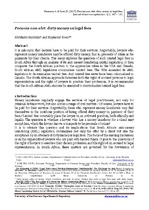| dc.contributor.author | Hamman, Abraham | |
| dc.contributor.author | Koen, Raymond | |
| dc.date.accessioned | 2017-08-29T06:42:52Z | |
| dc.date.available | 2017-08-29T06:42:52Z | |
| dc.date.issued | 2017 | |
| dc.identifier.citation | Hamman, A. & Koen, R. (2017). Pecunia non olet: dirty money as legal fees. Journal of anti-corruption law, 1(1): 107 – 131. | en_US |
| dc.identifier.issn | 2521-5345 | |
| dc.identifier.uri | http://hdl.handle.net/10566/3155 | |
| dc.description.abstract | It is axiomatic that lawyers have to be paid for their services. Regrettably, lawyers who represent money launderers may be offered dirty money, that is, proceeds of crime as fee payments by their clients. This essay explores the question of such tainted legal fees in South Africa through an analysis of its anti-money laundering (AML) legislation. It then compares the South African position to the approaches taken in the USA and Canada. South African AML legislation criminalises tainted fees. The USA amended its AML legislation to decriminalise tainted fees. And tainted fees never have been criminalised in Canada. The South African approach threatens both the right of accused persons to legal representation and the right of lawyers to practise their profession. It is recommended that the South African AML statutes be amended to decriminalise tainted legal fees. | en_US |
| dc.language.iso | en | en_US |
| dc.publisher | Bellville: University of the Western Cape | en_US |
| dc.subject | Pecunia non olet | en_US |
| dc.subject | Dirty money | en_US |
| dc.subject | Legal fees | en_US |
| dc.subject | Prevention Of Organised Crime Act | en_US |
| dc.title | Pecunia non olet: dirty money as legal fees | en_US |
| dc.type | Article | en_US |

